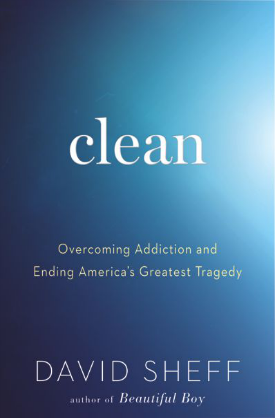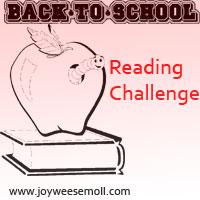Book: Clean: Overcoming Addiction and Ending America’s Greatest Tragedy by David Sheff
Genre: Nonfiction
Publisher: Houghton Mifflin Harcourt
Publication date: 2013
Pages: 374
Source: Library
 Summary: Citing the latest medical and psychological research, Clean by David Sheff makes the case that drug addiction is a disease (it has been declared so in the Diagnostic and Statistic Manual of Mental Disorders, the DSM, which is what psychiatrists use to diagnose illnesses) not a moral failing or character defect. The War on Drugs has been a dismal failure costing billions while Americans get hooked on drugs in ever higher numbers and ever younger ages.
Summary: Citing the latest medical and psychological research, Clean by David Sheff makes the case that drug addiction is a disease (it has been declared so in the Diagnostic and Statistic Manual of Mental Disorders, the DSM, which is what psychiatrists use to diagnose illnesses) not a moral failing or character defect. The War on Drugs has been a dismal failure costing billions while Americans get hooked on drugs in ever higher numbers and ever younger ages.
Thoughts: In the early part of Clean that focuses on prevention of drug use and addiction, especially among children, I kept thinking about How Children Succeed by Paul Tough (How Children Succeed by Paul Tough — A Back to School Read Along, September 11). Children on drugs are unlikely to succeed. As David Sheff says in Clean:
Looming in the future are the incalculable costs of a generation of kids growing up high. There’s much handwringing about America’s future competitiveness in light of the educational disparities between the United States and other nations, but we’ve ignored the fact that American teenagers use drugs at a higher rate than teens in any other country in the world. In this competition, the contest isn’t even close. p. xvii
Fortunately, the interventions that Paul Tough wanted to see in how we raise and educate children sound quite similar to the evidence David Sheff found about what really works to keep kids off drugs. Both books talked about the effects of trauma and stress on young lives and brains but, also, about ways to help parents and caregivers develop attachments with children that have proven to be effective in raising resilient kids.
Recent research shows that the adolescent brain is a whacky organ that makes drug use even more dangerous than expected. When our parents asked What were you thinking? and Where was your brain?, they were making an astute observation but, perhaps, not asking the most relevant questions. As kids grow older, there are ways of talking and listening to them that help teens think through situations before they encounter them so that they can be both independent and responsible. Motivational Interviewing, MI, is discussed in several places in Clean and I’ve already found the technique useful when talking to my husband and myself.
DARE, Drug Abuse Resistance Education, came along after I graduated from school but I always liked the idea of it. Turns out, it doesn’t work. Fortunately, there are other school-based interventions that do work. Perhaps it’s time that DARE change or the schools use other methods like this one that would also help children succeed as well as stay off drugs:
There’s ample evidence that schools can put in place programs that protect kids. One such program is geared for kids in elementary, middle, and high schools. Called Life Skills Training (LST), it’s an interactive program designed to build social and academic competencies and strengthen kids’ self-esteem, all of which lower drug use…. p. 62
At the point of diagnosis and treatment is where we, as a society, need to change our thinking and attention in order to develop more effective ways to reduce drug use and addiction:
Once and for all, people must understand that addiction is a disease. It’s critical if we’re going to effectively prevent and treat addiction. Accepting that addiction is an illness will transform our approach to public policy, research, insurance, and criminality; it will change how we feel about addicts, and how they feel about themselves. There’s another essential reason why we must understand that addiction is an illness and not just bad behavior: We punish behavior. We treat illness. p. 88
Satia of Satia’s Journal suggested that I read Clean in her comment to Book Review: The New Jim Crow by Michelle Alexander. The two books, in combination, reveal that we spend our money stupidly, incarcerating people who could, more cheaply, be treated in ways that will improve their lives and their ability to contribute to society.
Clean also echoed with Salt Sugar Fat by Michael Moss: Book Review: Salt Sugar Fat by Michael Moss (Part 3). Descriptions about the differences between brains of addicted versus unaddicted people sounded very similar to the brain discussion related to overeating in Salt Sugar Fat. The increased research that David Sheff calls for at the end of Clean will, I believe, benefit the majority of Americans who are overeating in our current troublesome food environment — in much the same that those of us who suffer from the lesser immune system disorders, like allergies, have benefited from AIDS research.
Appeal: If you are addicted to prescription or other drugs, or love someone who is, you need to read Clean. Although much more research needs to be done, a lot is well-understood now about how to diagnose and treat drug addiction — but it’s different from what we think we know by our exposure to media.
Other readers will appreciate Clean — especially anyone who likes well-written books by journalists who seek out the latest research while interviewing the researchers.
 Challenges: This is the fourth book I’ve reviewed for the Back to School Reading Challenge.
Challenges: This is the fourth book I’ve reviewed for the Back to School Reading Challenge.
Have you read this book? What did you think?

